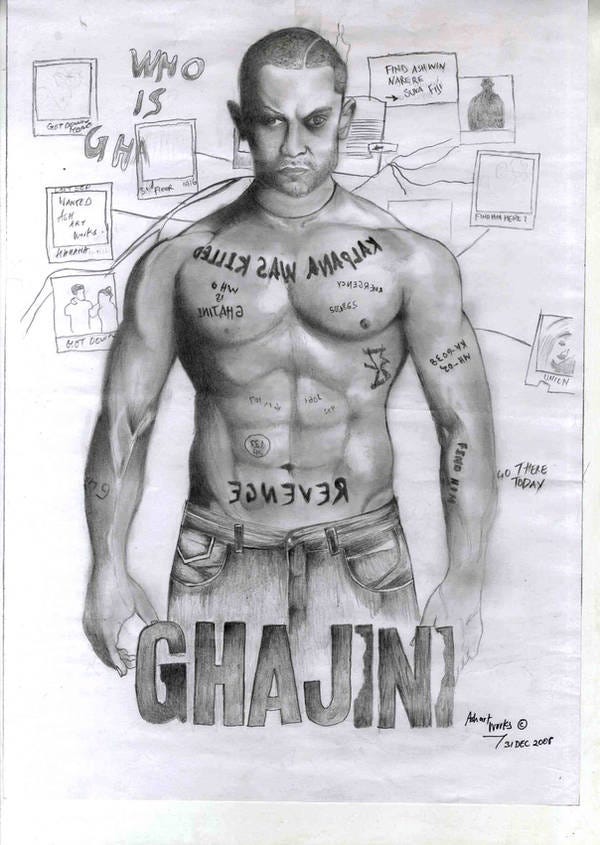The Ghajini Problem and Model Context Protocol
Understanding Model Context Protocol without a Computer Science Degree
Imagine sitting across from a brilliant but forgetful friend at a coffee shop. This friend can have amazing conversations, solve complex problems, and tell wonderful stories—but only about things you've discussed in the current conversation. If you walk away for an hour and come back, they'll have forgotten everything you talked about.
This is the fundamental challenge of modern AI systems: they have limited "working memory" called context. The Model Context Protocol (MCP) is a revolutionary approach to solving this problem, but understanding it can be challenging for non-technical people. Let me break it down in simple terms.
The Ghajini Problem: When Memory Fails
If you've seen the Bollywood film Ghajini (or its Hollywood inspiration Memento), you'll recall the protagonist suffers from anterograde amnesia—he cannot form new long-term memories and forgets everything after roughly 15 minutes. To function, he takes Polaroid photos and writes notes on his body to preserve crucial information.
Traditional AI systems face a remarkably similar challenge. Think of them like the character Sanjay in Ghajini:
Limited memory span: Just as Sanjay can only remember the last 15 minutes of his life, AI systems can only "remember" a limited amount of conversation.
Forced forgetting: When new information comes in, the oldest memories get pushed out—like Polaroid photos falling out of Sanjay's pocket.
No retrieval mechanism: Without external aids (like Sanjay's tattoos and photos), once information is forgotten, it's completely inaccessible.
This creates the frustrating experience where an AI might forget important details from earlier in your conversation simply because too many words have passed between you.
MCP: From Ghajini to Perfect Memory
The Model Context Protocol transforms this Ghajini-like memory limitation into something more like a perfectly functioning memory system with sophisticated tools:
A memory system, not just memory: Instead of Sanjay's desperate Polaroids and tattoos, imagine if he had a sophisticated system that automatically organized his experiences by importance.
Smart summaries: Rather than writing every detail on his body, imagine if Sanjay could create perfect summaries of key events that capture all essential information.
Connected memories: Instead of isolated fragments, imagine if Sanjay could instantly see how new information connected to his past experiences, even without remembering those experiences directly.
How MCP Works: The Neighborhood Potluck Analogy
Imagine you're organizing a neighborhood potluck dinner with dozens of neighbors. You need to remember who's bringing what, who has allergies, which dishes pair well together, and countless other details.
The Old Way (Traditional Context): You try to memorize everything about everyone and every dish. Inevitably, you forget that Mrs. Johnson is bringing her famous apple pie and accidentally ask Mr. Peterson to bring one too.
The MCP Way:
You create categories: Main dishes, desserts, drinks, etc.
You identify key relationships: "The Smiths always coordinate with the Wilsons on complementary dishes."
You summarize when possible: Instead of remembering every ingredient in every dish, you remember "The Johnsons handle all nut-free desserts."
The Four Pillars of MCP in Everyday Terms
1. Context Compression: The Vacation Photo Album
Traditional context is like keeping every single photo from your vacation. MCP is like creating a highlight album that captures the essence of your trip without needing thousands of pictures.
When I visited Italy last summer, I took over 2,000 photos. But when showing friends, I selected just 50 that told the complete story of my journey. MCP does something similar by compressing lengthy exchanges into their essential meaning.
2. External Memory: Ghajini's Perfect System
In Ghajini, the protagonist relies on Polaroid photos, notes, and tattoos as external memory—but his system is chaotic and incomplete. He struggles to organize information, often misinterprets his own notes, and can't search his "database" efficiently.
MCP gives AI systems a far more sophisticated version of Sanjay's external memory system. Instead of scattered photos and desperate tattoos, imagine if Sanjay had a perfectly organized digital archive of his experiences that he could instantly search. "Who is Kalpana?" would immediately retrieve all relevant memories about that person, complete with emotional context and relationship history.
This is what MCP provides: not just storage, but intelligent, searchable external memory that becomes available precisely when needed.
3. Retrieval-Augmented Generation: The Expert Friend Consultation
Imagine you're planning a trip to Japan. You have a friend who lived there for years. When making your plans, you don't need your friend to recite everything they know about Japan—you just ask specific questions when relevant.
MCP works similarly. Instead of loading all possible information into context, it retrieves only what's relevant to the current conversation. "Tell me about good restaurants in Kyoto" triggers the system to pull in specific information about Kyoto dining without needing to load everything about Japan.
4. Chunking and Relationships: The Family Tree Metaphor
Think about how you understand your family relationships. You don't need to constantly review the entire family tree to know that your mother's sister is your aunt. You understand relationships between chunks of information.
MCP organizes information in a similar way, creating logical connections between different pieces of knowledge. When you mention your cousin, the system can immediately understand the relationship to other family members without needing to rebuild the entire family tree.
Real-World Benefits: The Difference You'll Notice
Longer Memory Without Confusion
Without MCP, talking to an AI about a long document is like trying to discuss a novel with someone who can only remember the last few chapters. With MCP, it's like talking to someone who has thoughtfully annotated the book and can quickly reference any important passage.
More Coherent Responses
Traditional context is like trying to have a conversation in a noisy room where you occasionally miss words. MCP is like having that same conversation in a quiet room with perfect acoustics—the entire exchange makes more sense.
More Efficient Processing
Without MCP, using AI for complex tasks is like hiring a researcher who must re-read the entire library every time you ask a new question. With MCP, it's like working with an expert who has the library well-organized and at their fingertips.
The Future: From Short-Term to Long-Term Relationships
The most exciting promise of MCP is transforming our relationship with AI systems from transactional to continuous. Instead of starting fresh each time, your AI assistant could truly get to know you over time.
It's the difference between:
Explaining your coffee preference to a new barista every morning
Having a barista who remembers you like your latte with oat milk and just a touch of vanilla
Why This Matters for Everyone
You don't need to understand the technical details of how your car's engine works to appreciate that it gets you from point A to point B. Similarly, you don't need to understand the inner workings of MCP to benefit from its improvements to AI systems.
What matters is that the frustrating limitations of AI—forgetting earlier parts of conversations, being unable to work with long documents, and lacking coherence over extended interactions—are being systematically addressed through innovations like the Model Context Protocol.
In the near future, you won't think about "context windows" or "token limits" any more than you think about how many cylinders your car has during your daily commute. You'll simply enjoy the smoother, more helpful, and more human-like interactions with increasingly capable AI systems.
And that's the true promise of MCP: not just a technical improvement, but a fundamental shift in how naturally we can interact with artificial intelligence.



